
Did You Know?
- Starting vitamin C once you’re sick has not been shown to decrease symptom duration.
- For vitamin C to be effective at helping fend off a cold or flu like symptoms and decrease symptom duration, it must be taken ongoing, prior to getting sick.
- Don’t start and stop dosages over 1000mg quickly. This can temporarily cause a vitamin C deficiency (called Scurvy) with dry skin and dry lips. Decrease dosing by 250mg a day.
Vitamin C, known scientifically as ascorbic acid, has long been hailed for its remarkable capacity to fortify the immune system. Beyond its well-recognized role as an antioxidant, this water-soluble vitamin holds a pivotal place in promoting immune system resilience through a series of intricate mechanisms. In part five in our series: exploring immune-boosting supplements for fall wellness – let’s delve into the depths of how vitamin C empowers the body’s defenses, it becomes evident why this nutrient is an essential ally in bolstering immune support.
Immune Sentinel: Repelling Oxidative Stress and Inflammation
At the heart of elderberry’s immune-boosting prowess lies a group of plant compounds known as flavonoids, with anthocyanins taking center stage. These vibrant pigments contribute to the deep purple hue of elderberries and play a crucial role in its health benefits. Anthocyanins possess potent antioxidant properties that combat oxidative stress and neutralize harmful free radicals [1]. By reducing oxidative damage to cells and tissues, anthocyanins indirectly support the immune system by preserving cellular integrity and vitality.
Immune Cell Activation: Strengthening Defenses
At the heart of its immune-boosting prowess, vitamin C acts as a staunch defender against oxidative stress. By quenching harmful free radicals and preventing cellular damage, vitamin C plays a key role in maintaining immune cells’ optimal functioning [1]. Moreover, this nutrient exerts anti-inflammatory effects, dampening the excessive inflammation that can undermine immune responses [2]. By reducing oxidative stress and inflammation, vitamin C ensures that immune cells remain primed and ready to combat threats.
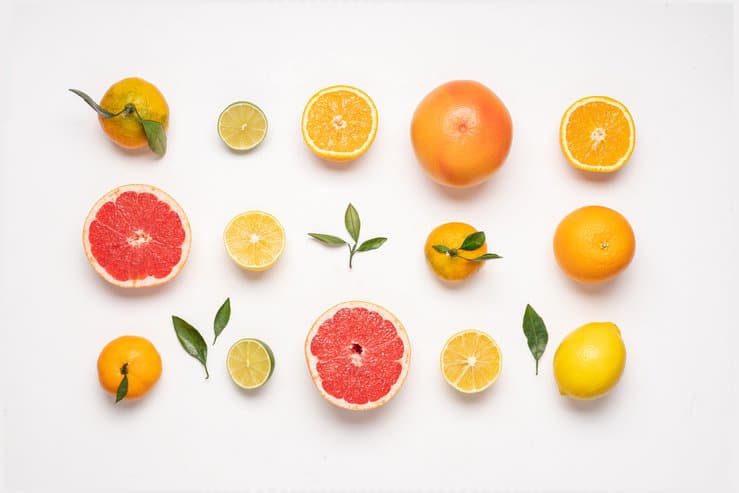
Guardian of Immune Cell Functionality: From Neutrophils to Lymphocytes
Vitamin C emerges as a guardian of immune cell functionality. It enhances the production and activity of various immune cells, including neutrophils and lymphocytes, which are vital defenders against infections [3]. Vitamin C’s influence extends to enhancing the mobility of immune cells to infection sites, facilitating their interaction with pathogens [4]. This active involvement of vitamin C equips the immune system with the necessary tools to swiftly identify and neutralize invading microorganisms.
Barrier Reinforcement: Supporting Skin and Mucous Membranes
Vitamin C extends its immune-boosting effects to physical barriers, such as the skin and mucous membranes. These barriers act as the first line of defense against pathogens. By promoting the production and maintenance of collagen, vitamin C contributes to the integrity of skin and mucous membranes, making them less susceptible to breaches by harmful microorganisms [5]. This reinforcement of barriers adds an extra layer of protection to prevent infections from gaining a foothold.
Cytokine Champion: Orchestrating Immune Responses
Cytokines, signaling molecules that orchestrate immune responses, play a vital role in the body’s defense mechanism. Vitamin C influences the production and function of cytokines, contributing to a balanced and effective immune response [6]. By modulating cytokine levels, vitamin C helps prevent immune overactivity that can lead to autoimmune conditions while ensuring an appropriate response against infections.
Immune System Priming: A Holistic Approach to Protection
In essence, vitamin C primes the immune system for optimal performance. By bolstering immune cell functionality, supporting barrier integrity, and fine-tuning immune responses, this nutrient lays the foundation for a resilient defense mechanism. A well-functioning immune system is not just about fighting off infections; it’s also about maintaining balance and preventing chronic inflammation that can undermine overall health.
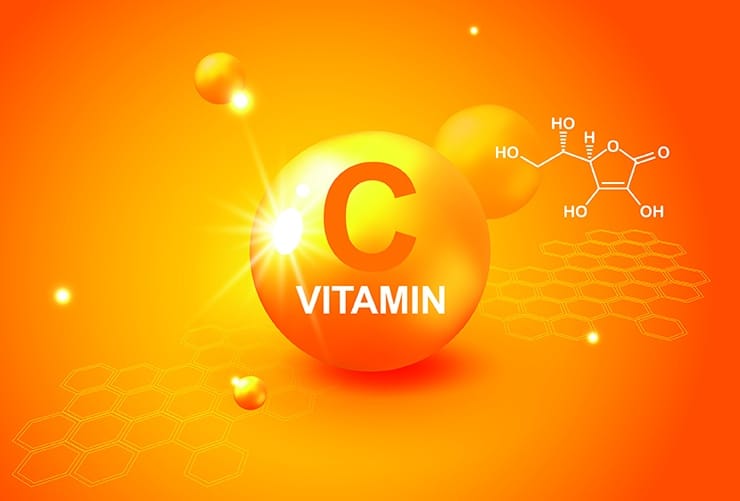
Supplementation
While vitamin C-rich foods like citrus fruits are readily available, supplementing with vitamin C during fall can provide an extra layer of defense against seasonal illnesses.
The RDA is set at 90mg for men and 75mg for women. These levels are set to prevent deficiency (scurvy), but they are not ideal daily dosages, allowing vitamin C to function as an antioxidant and to prevent chronic disease. Vitamin C reduces endothelial dysfunction, heart disease and even stroke [7].
Daily dosing recommendations to help bolster the immune system and fight off the common cold or flu, is 1000-2000mg a day. However, vitamin C must be taken prior to getting a cold, otherwise there are no improvements with cold duration. Studies have tested post onset cold dosing of 1000-8000mg daily and no statistical difference in the duration of the cold was found [8].
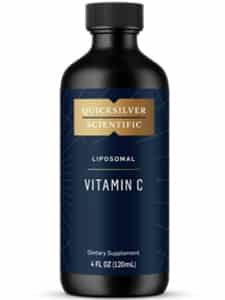 |
Liposomal Vitamin C, Quicksilver Scientific Liquid liposomal vitamin C |
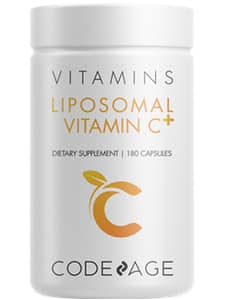 |
Liposomal Vitamin C+, Codeage This is a great immune boosting supplement that contains 1500mg of vitamin C per serving PLUS zinc, alpha lipoic acid, phosphatidylcholine, citrus bioflavonoids, quercetin, elderberry powder and rosehips. |
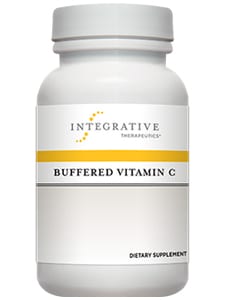 |
Buffered Vitamin C, Integrative Therapeutics 1000mg/capsule that’s gentle on the stomach |
If taken regularly, the benefit of vitamin C supplementation is seen in the duration of colds, with a greater benefit in children than in adults: The pooled effect of vitamin C supplementation was a 14% reduction in cold duration in children and an 8% reduction in adults [9]. I recommend taking 1000mg of vitamin C daily through the fall, winter and through earlier spring seasons.
Another study looked at the connection between histamine release with respiratory viruses, which contribute to symptoms like runny nose and congestion. The study suggests that vitamin C may help reduce the release of histamine, which could contribute to the alleviation of cold symptoms [10].
It’s important to note that high doses of vitamin C (over 2000mg daily) might cause gastrointestinal discomfort in some individuals, so starting with a moderate dose and gradually increasing it is advisable.
Also, do not start and stop large dosages. Doing so may temporarily cause a mild case of scurvy (vitamin C deficiency), which will manifest with dry skin and cracked lips. To prevent this, decrease by 250-500mg a day.
- Carr, A. C., & Maggini, S. (2017). Vitamin C and Immune Function. Nutrients, 9(11), 1211. doi:10.3390/nu9111211
- Wintergerst, E. S., Maggini, S., & Hornig, D. H. (2006). Immune-enhancing role of vitamin C and zinc and effect on clinical conditions. Annals of Nutrition and Metabolism, 50(2), 85-94. doi:10.1159/000090495
- Hemilä, H. (2017). Vitamin C and Infections. Nutrients, 9(4), 339. doi:10.3390/nu9040339
- Raman, G., & Tatsioni, A. (2017). Vitamin C supplementation and the risk of pneumonia: A systematic review and meta-analysis of randomized controlled trials. Nutrients, 9(6), 653. doi:10.3390/nu9060653
- Pullar, J. M., Carr, A. C., & Vissers, M. (2017). The Roles of Vitamin C in Skin Health. Nutrients, 9(8), 866. doi:10.3390/nu9080866
- Maggini, S., Beveridge, S., & Sorbara, J. P. (2018). Focus on Vitamin D, Inflammation and Type 2 Diabetes. Nutrients, 10(9), 1181. doi:10.3390/nu10091181
- Matsuzawa Y, Kwon TG, Lennon RJ, Lerman LO, Lerman A. Prognostic value of flow-mediated vasodilation in brachial artery and fingertip artery for cardiovascular events: a systematic review and meta-analysis. J Am Heart Assoc. 2015;4(11).
- Carr, A. C., & Maggini, S. (2017). Vitamin C and immune function. Nutrients, 9(11), 1211. doi:10.3390/nu9111211
- Hemila H, Chalker E. Vitamin C for preventing and treating the common cold. Cochrane Database Syst Rev. 2013(1):Cd000980
- Johnston, C. S., & Zee, J. (1996). The Antihistamine Action of Ascorbic Acid. Subcellular Biochemistry, 25, 189-213. doi:10.1007/978-1-4613-0325-1_13
Enjoying this content? Sign up for updates... It's FREE!


